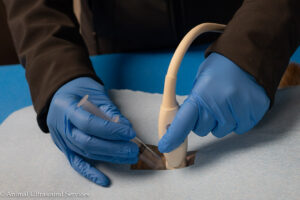What is a Fine Needle Aspirate?
A fine needle aspirate, or FNA , is a type of biopsy procedure where a hollow needle is inserted into a suspicious area and a small number of cells are collected into a syringe. The sample is sent to a laboratory where pathologists can look for cancer, infection, or other diseases. Your veterinarian may recommend a fine needle aspirate if they suspect a mass inside the body, or if labwork suggests a problem with one of the organs.

An ultrasound probe is used to guide the needle into the suspicious area
How is a fine needle aspirate different than a biopsy?
FNA uses a very small needle (similar to the type of needle your pet would have gotten vaccines with) to collect a sample. It is less invasive and less uncomfortable than a biopsy, and does not require an incision. It is typically performed awake or with minimal sedation. However, because the needle is so small, it only collects a few cells. This means that sometimes we don’t get the right cells to make a diagnosis. Diagnostic yields for fine needle aspirate are generally about 50%, higher for certain types of cancer, and lower for inflammatory diseases. Our veterinarians will discuss whether fine needle aspirate may be the right choice for your pet.
What are the risks of fine needle aspirates?
Risk of FNA is typically low, consisting of bleeding in less than 3% of cases.
What are the benefits of fine needle aspirates?
While not a perfect test, FNA is still the least expensive and least invasive way to potentially get a diagnosis. They may be performed awake or under light sedation, do not cause discomfort, do not require an incision, and do not necessitate a hospital stay. Consequently, in many cases they are worth trying before committing to a more invasive biopsy.
